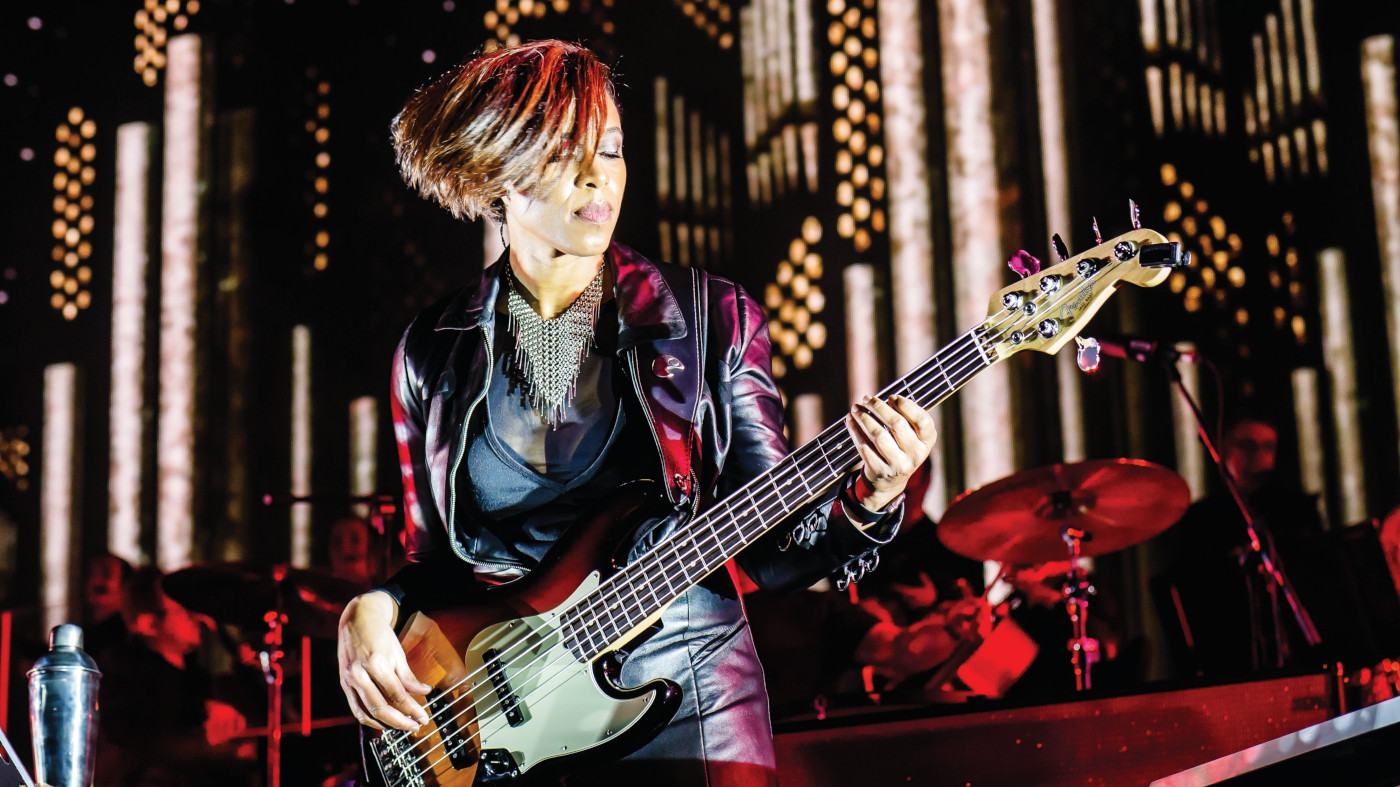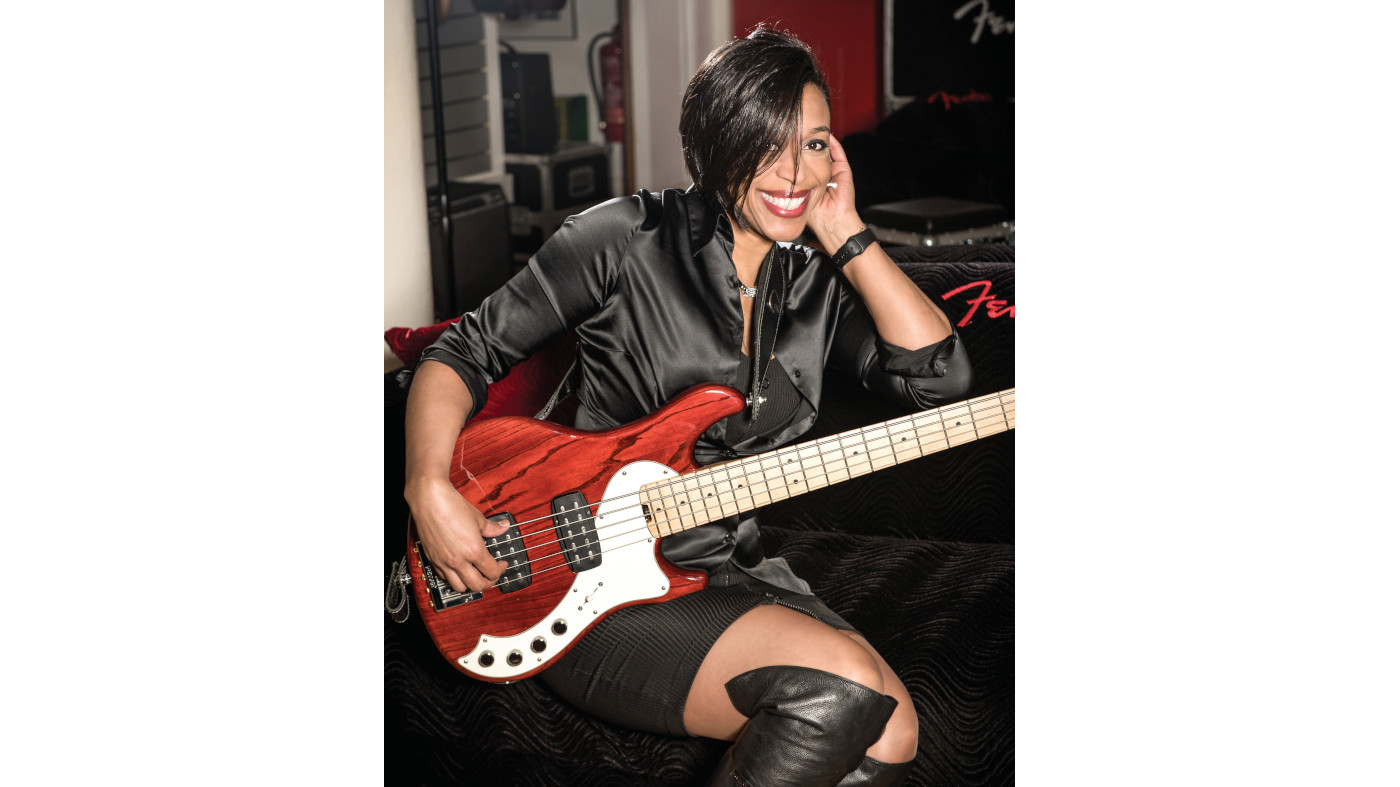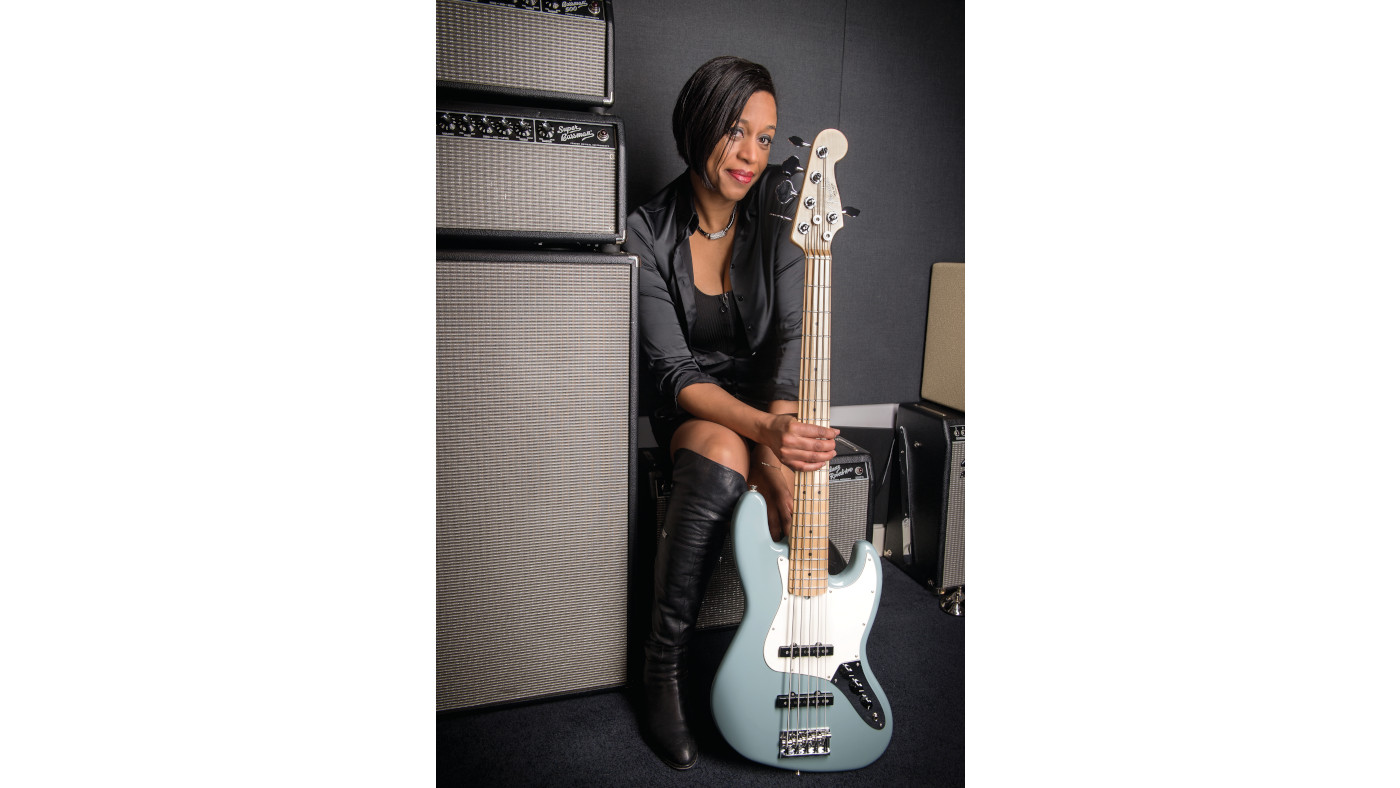Yolanda Charles: “I was always told that you can’t teach feel, but I think you can”
We talk inequality, experience and lost gear with the UK bassist

After her stellar career with Robbie Williams, Paul Weller, Hans Zimmer, Squeeze and many other projects, Yolanda Charles is returning to her funk-heavy roots.
We last met you at the Warwick Bass Camp, Yolanda. How was it for you?
“It was really fun. I wasn’t sure what to expect, although I’ve been around trade events before. They can be quite draining, and although it was full-on, it was still fun. It’s such a privilege to hang out with people like Dennis Chambers and Alphonso Johnson, which, I have to say, I never imagined would happen in my life. When I was younger, it was like climbing Mount Everest, a different universe, and you could never imagine rubbing shoulders with the likes of these people. But over the years, as my career has progressed, I’ve become more qualified on the ‘muso’ scene, shall we say - and that has meant I’ve been able to meet, play and hang out with musicians of a calibre that I admire and respect.”
You were teaching at that event - is that something you do a lot of?
Women need to be very high-profile to be recognised over other bass players
“I did my first bit of teaching back at college, I stood in for the bass teacher a couple of times. Then I found myself in the position where I could do some one-to-one teaching, and I had a nice run of private students. Then in 2006, I was invited onto a popular music course to do a masterclass, which I had never done before. It was terrifying, but I’ve progressed from there over the past 10 years to doing, for example, a three-hour solo masterclass at the Royal Northern College of Music.
“Nowadays I’m absolutely comfortable doing that. That Warwick session was great because I offered to do some sessions on syncopation, beat placement and timing and incorporated all three things into my classes. I’m going to develop my masterclasses now to incorporate all of this. I was always told that you can’t teach feel, but I think you can, and I’m trying to formulate a way to convey it through exercises and approach.”
A growing number of high-profile female bassists are coming through. Is that because any boundaries that existed for female bassists are being removed at last?
Get the MusicRadar Newsletter
Want all the hottest music and gear news, reviews, deals, features and more, direct to your inbox? Sign up here.
“No, I don’t think they are being removed. The reason that someone like Divinity Roxx, Nik West and a few others are getting more of a profile is because of the amount of work they’ve put into their career. A musician may get breaks and get to work on great gigs, but after that things can slow down again if you don’t do your own thing, because there is so much competition. All bass players need some kind of angle other than just being a good bass player, and the women you’re referring to need to be very high-profile to be recognised over other bass players. They put a lot of work into their fanbase, making records, being seen, putting videos up and really putting some effort into that. The women have done great to get to that place and forge a career.”

Touch, tone and good taste
Are women being offered sessions, tours and recording work as often as the guys?
“I don’t think they are. I think it’s still a man’s world in that respect. The way that female players are perceived - as not as good as the guys - hasn’t changed.”
Do people appreciate what you’ve done, career-wise?
I still find myself having to qualify my position, and they reserve their judgement until I’ve played the notes
“It depends. In the world of bass, people may know who I am - but outside of that, not many people know who I am or what I do. I was around doing the UK music programmes on TV before it all started dying out, but I wouldn’t say that being on TV helped me to get recognised. In session situations where I’ve been brought in by somebody, maybe the artist knows me, but the MD doesn’t. I still find myself having to qualify my position, and they reserve their judgement until I’ve played the notes. But I don’t care if I have to justify my role. I don’t agree with musicians being set up as deities or put on pedestals, because I’ve known too many musicians who haven’t had the opportunity or been in the right place at the right time to get those gigs which can make your CV look amazing. If I judge a musician at all, it’s by how they play. If it’s rocking and in the pocket, I’m happy. It’s not about what’s on your CV, it’s about touch, tone and good taste.”
In recent years, you’ve toured with Hans Zimmer and joined Squeeze.
“Working with Hans is absolutely fantastic. I was reading and working with clicks that had tempo changes throughout. If you can’t play in time with a click, you can’t do a gig like that. And for Squeeze, Chris Difford dropped me a direct message on Twitter, and asked if I’d like to play on a new album, The Knowledge, that they were going to record. I assumed that that was a session, so I said yes - I say yes to every session! Then management contacted me, and Glenn Tilbrook came down to watch me sit in on a gig with Alex Skolnick at Pizza Express. He enjoyed my playing in that fusion setting, which I’d thought might be a deal-breaker. The next thing we were in the studio; they sent a few demos through, some had lyrics, some didn’t. We went through these tunes and came up with our parts on the fly and recorded it live.”
What gear did you use for The Knowledge?
“Mentally I put my Paul Weller hat on and came down with my ’65 Jazz bass, because it’s the sort of bass that nobody seems to refuse - but I’d just got my Fender American Pro five-string and I’d been using it on the Hans Zimmer shows so I ended up using it for the whole album. Glenn said he thought the bass sounded incredible, and it did, plugged into my 800 watt Class D Fender amp and a 4x10 cabinet. They were happy so I was happy! Then for the live shows, I used my Super Bassman amp and an 8x10 cab. I’m a full Fender endorser and I also use D’Addario NYXL 45-130 strings. Once I was booked for the gigs, I realised that they don’t really use session players - and then I realised that I was in the band!”

Four-string fire
You recently lost a lot of equipment in a fire at a storage facility in North London.
There’s a lot of focus on playing abilities now, with lots of videos of chopsy playing which have, for me, less emphasis on beautiful, tasteful bass playing
“I lost both of my blue Levinson Blade basses, which hurts - but those basses were superseded by my active Fender Dimensions, which is why they were in storage. Thankfully, all the basses that I use were at my house, so I still have my Mayones Jabba which I use a lot and sounds amazing, and all of my vintage instruments. My 65 Jazz, I picked up two days before the fire. I lost five in total - the two Blades, my four-string Fender Dimension, my Sei bass that Martin Petersen made for me in 1993, and my semi-acoustic Fenix which I had had for 20 years - and which, having had 20 years of work on it, had started to sound so awesome.”
How is the world of bass developing?
“There’s a lot of focus on playing abilities now, with lots of videos of chopsy playing which have, for me, less emphasis on beautiful, tasteful bass playing. This is probably a reflection of popular music having less bass guitar in the recordings. All that creativity has to go somewhere! I’ve found that people don’t have time to meet up and be creative, but I’m lucky enough to know a bunch of musicians who are willing to explore music with no outside pressures or financial incentives.”
What does the future hold for you?
“I don’t really want to be another female, singing, slapping bass player, as it’s got to a point where I’m less interested in singing and playing as a challenge - so I’m developing a project that’s a bit different for me, involving my new band, Project PH, which has London dates coming up. I love my jam sessions at the Spice Of Life in London: musicians get up and jam songs from a prearranged list. I’m also working with the guitarist and composer Phil Braithwaite. There are Squeeze and Hans Zimmer shows on the way too. There’s still plenty of creativity in me.”


“Every note counts and fits perfectly”: Kirk Hammett names his best Metallica solo – and no, it’s not One or Master Of Puppets
“I can write anything... Just tell me what you want. You want death metal in C? Okay, here it is. A little country and western? Reggae, blues, whatever”: Yngwie Malmsteen on classical epiphanies, modern art and why he embraces the cliff edge









